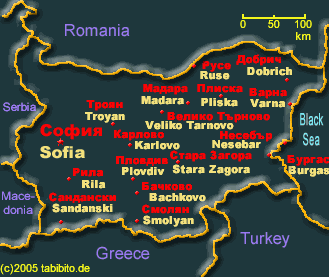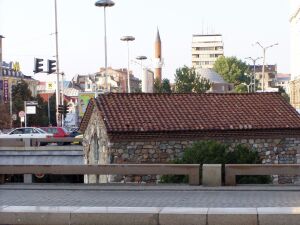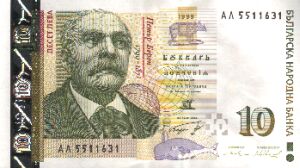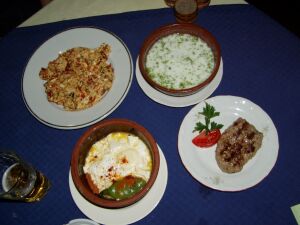|
|
|
|
|
|
 Official name:
Република
Българиа
(Republika Bălgaria) Republic of Bulgaria
Area: 110,000 km² (as big as Virginia, slightly smaller than England)
Population: 7.5 Mio* (2003) around the same as Greater London
Ethnic groups: Almost 84 % Bulgarians,
10 % Turks, <5% Roma, smaller minorities of Armenians, Tartars, Macedonians etc.*
Religions:
Not surprisingly, around 84% are Bulgarian-Orthodox, around 12% Muslims, Catholic, Protestant and
Jewish minorities.
Time zone: Eastern European time: GMT +02 hrs, with daylight-saving time
(+1 hour) in summer.
Language: Bulgarian. This language belongs to the
South Slavic language group, which is part of the satem branch of the Indo-European
language family. Worldwide, only around 8 million people call Bulgarian their mother tongue, which means
that it's a minor language. Sooner, this was different: Around the 10th century, Bulgarian was almost
identical to Old Church Slavonic, and so it was the third most important
written language in medieval Europe. To say it shortly, Bulgarian is quite close to Russian
(with Russian deriving from Bulgarian, not vice versa). Bulgarian uses azbuka, better known
as Cyrillic letters. However, the letter [ ъ ]
marks an important difference. In Russian, it's the so-called hard sign without its own
pronunciation. In Bulgarian, it's a mix of [ a ] and the schwa [ ə ]. Or - to say it simplier - it's
a very short [ a ]. The first four letters in the country name are
[ Бълг ] -
b-hard sign-l-g, which is impossible to read in Russian. In Bulgarian, it is pronounced as [ Bəlgaria ],
with a very short vowel. It's often written [Bălgaria] as well.
Knowing some Russian is of great help in Bulgaria, but there are also some distinctive Bulgarian
dialects which are hard to understand. For a table with the most important vocabulary in Bulgarian
and other Slavic languages →click here.
Official name:
Република
Българиа
(Republika Bălgaria) Republic of Bulgaria
Area: 110,000 km² (as big as Virginia, slightly smaller than England)
Population: 7.5 Mio* (2003) around the same as Greater London
Ethnic groups: Almost 84 % Bulgarians,
10 % Turks, <5% Roma, smaller minorities of Armenians, Tartars, Macedonians etc.*
Religions:
Not surprisingly, around 84% are Bulgarian-Orthodox, around 12% Muslims, Catholic, Protestant and
Jewish minorities.
Time zone: Eastern European time: GMT +02 hrs, with daylight-saving time
(+1 hour) in summer.
Language: Bulgarian. This language belongs to the
South Slavic language group, which is part of the satem branch of the Indo-European
language family. Worldwide, only around 8 million people call Bulgarian their mother tongue, which means
that it's a minor language. Sooner, this was different: Around the 10th century, Bulgarian was almost
identical to Old Church Slavonic, and so it was the third most important
written language in medieval Europe. To say it shortly, Bulgarian is quite close to Russian
(with Russian deriving from Bulgarian, not vice versa). Bulgarian uses azbuka, better known
as Cyrillic letters. However, the letter [ ъ ]
marks an important difference. In Russian, it's the so-called hard sign without its own
pronunciation. In Bulgarian, it's a mix of [ a ] and the schwa [ ə ]. Or - to say it simplier - it's
a very short [ a ]. The first four letters in the country name are
[ Бълг ] -
b-hard sign-l-g, which is impossible to read in Russian. In Bulgarian, it is pronounced as [ Bəlgaria ],
with a very short vowel. It's often written [Bălgaria] as well.
Knowing some Russian is of great help in Bulgaria, but there are also some distinctive Bulgarian
dialects which are hard to understand. For a table with the most important vocabulary in Bulgarian
and other Slavic languages →click here.
|
|
|
|
|
|
|
 Bulgaria occupies a wide part of the central Balkan peninsula. In the north, the Danube marks most of the
border to Romania. In the west, Bulgaria shares borders with Serbia and Macedonia, in the south with Greece
and Turkey. In the east, the country borders on the Black Sea. The beautiful coastline is around
350 km long. A large part of the country is mountainous terrain. Especially the mountain ranges
Stara Planina, Rodopi and Strandsha
dominate the small country, but there are also some small but highly impressive massifs such as Rila and
Pirin. The highest peak of the country can be found in the Rila massif - it's the 2,925 m high
Musala. The one and only large plain can be found along the Dabube.
This plain offers very fertile chernozem-like soils and therefore it's used as Bulgaria's granary.
Bulgaria occupies a wide part of the central Balkan peninsula. In the north, the Danube marks most of the
border to Romania. In the west, Bulgaria shares borders with Serbia and Macedonia, in the south with Greece
and Turkey. In the east, the country borders on the Black Sea. The beautiful coastline is around
350 km long. A large part of the country is mountainous terrain. Especially the mountain ranges
Stara Planina, Rodopi and Strandsha
dominate the small country, but there are also some small but highly impressive massifs such as Rila and
Pirin. The highest peak of the country can be found in the Rila massif - it's the 2,925 m high
Musala. The one and only large plain can be found along the Dabube.
This plain offers very fertile chernozem-like soils and therefore it's used as Bulgaria's granary.
Although the country is comparatively small, it offers an amazing variety of landscapes, with more than
a few of them protected by national parks. Among them, Rodopi national park
(see →Smolyan), Rila national park
(see →Rila and the amazing
national park along Ropotamo river in the south-east of Bulgaria are
definitely worth a visit. There are many scenic roads in Bulgaria, but my personal favourite
(although it's hard to pick a favourite here) is
the road connecting Michurin (south of Burgas) with Malko Tarnovo (at the Turkish border) -
a highly interesting landscape with some sleepy little villages. 100% backwoods.
|
|
|
|
|
|
|

| |
Multifarious Bulgaria: Mosques, Churches and more
|
Tsar Boris I., one of the emperors of the First Empire, managed to unify and chrisitianize the
nation. During the reign of one of his successors, Tsar Simeon,
the Bulgarian Empire reached its biggest extent - it occupied almost all of the Balkan. After Tsar Simeons death,
the Empire gradually declined. Preslav, at that time capital of Bulgaria, was conquered by the Byzantine Empire.
Therefore, the capital was shifted to →Ohrid in present-day Macedonia.
In 1018, the Byzantine Empire controlled the entire empire. Two brothers, Asen and Peter,
led a successful uprising against the occupants in 1185. Only one year later, they founded the
Second Bulgarian Empire with →Veliko Tarnovo
as the new, shining capital.
This second Bulgarian heyday was over in 1396. The Ottomans had already crushed the Byzantine Empire,
and Bulgaria was next. The Ottomans conquered the entire country and started settling in the area.
Only a few monasteries, such as →Rila, could guarantee the Bulgarian cultural identity.
During the very long occupation, some Bulgarians converted to Islam. The so-called Pomaks,
muslim Bulgarians, can still be found here and there in Bulgaria and north-west Turkey.
The situation shouldn't change during the following centuries. Bulgaria remained an Ottoman province.
The Bulgarian culture and its symbols gradually perished. Countless churches and monasteries were destroyed
systematically. In 1876, Bulgarians initiated the Koprivshtitsa uprising, but this was
brutally put down by the Ottoman rulers. However, the rest of Europe had heard about the uprising and living conditions
in Bulgaria, and so Russia declared war on the Ottomans. Bloody fights erupted in Pleven and around the Shipka Pass,
leaving around 200,000 Russians and Bulgarians dead (the number of Ottoman victims is not known).
Eventually, Russia managed to push the Ottomans out of the country.
The Treaty of San Stefano gave way to an independent Bulgaria, covering a large part of the
Balkan peninsula. But the treaty was revised in the Congress of Berlin in the same year.
As a result, South Bulgaria aka East Rumelia, parts of present-day Greece and Macedonia
became parts of the Ottoman Empire again.
In 1879, the first National Assembly took place and agreed on a constitution. The ruler was to be a German monarch.
However, Bulgaria couldn't declare full independence before 1908. Shortly after that, Bulgaria, together with
Serbia and Greece, started the First Balkan War to drive the Ottomans out of Europe.
Less successful for Bulgaria was the Second Balkan War, which broke out between the
former alliance a few years later. Bulgaria lost the war and as a result, it had lost present-day
→Macedonia. After the war, chaos reigned. During the Second World War,
Bulgaria formed an Alliance with Nazi Germany, but its leaders refused to hand over the Jewish minority. At the same time, the
communists grew stronger. At the end of the war, the country even suffered massive air strikes by the Allies.
In September 1944, the Red Army occupied the country, and the Bulgarian Fatherland Front gained
power. Communist rule, backed by the Soviets, followed. Georgi Dimitrov became the first president.
He was followed by Todor Shhivkov in 1962. Not much had changed then until the year 1989,
when an internal party coup swept away Shivkov. The Communist party started some reforms but remained in power.
During the 1990ies, the government changed a couple of times, and chaos broke out. The country gradually declined.
Political unrests, the occupation of the parliament by demonstrators, hyper inflation, mass dismissals etc
severely destabilised the country. But things got better now. In 2001, king Simeon II (king of Saxonia-Coburg-Gotha, Germany)
was elected (!) president. He returned from his exile to rule the country, but after a short while he found himself in
trouble as well (as of 2003, check for recent news).
Nowadays, the country has a serious population problem. The growth rate has been negative for a couple of years already.
And it's not -0.2% or so but -1 %, which is, if continuing like this, desastrous. The netto migration rate is -4.5 per 1,000 inhabitants,
which is another serious problem. 1/8 of the Bulgarians are living at or below poverty line (much less than years before), but
unemployment rate is around 18 %. In 2004, Bulgaria joined the NATO,
and additionally the country is trying hard to gain full membership of the EU.
|
|
|
|
|
|
|
Prologue:
Many people associate the country with the Black Sea coast and tourist ghettos
lining up along the seashore. Which is really a pity - there's so much to discover in the
country. Like a lot of culture, much history, stunning landscapes, good food and so on.
Sure the beaches are nice, but the real jewels of Bulgaria can only be found in the hinterland.
Visa: Most nationalities do not require a visa any longer -
travelers from the EU, Canada, USA, Australia, UK, Japan etc can stay one month (some even 3 months) in the
country with nothing more than a valid passport. Border controls have eased considerably as well -
corruption at crossing points seems to have vanished. Welcome to Europe, Bulgaria!

| |
10 Leva bill
|
Costs: Bulgaria is still one of the cheapest destinations in the
area. Accommodation in simple but mostly clean hotels or pensions rarely
costs more than € 10 per person in a double room. Private accommodation (often offered
by older ladies at bus stations) can be as cheap as € 2 per night.
Eating out in restaurants is extremely cheap. The same can be said about
train and busrides. The amazing thing about it is the quality. If you think that
dinner for € 2 and an espresso for € 0.20 is going to be of rather poor quality, you will
soon find out that it's wrong. I have no idea how Bulgarians manage to sell things that cheap, but somehow
they do. It goes without saying that prices at the seashore are substantially higher (but still cheap).
Getting there: Bus, train, plane, car - you name it. By now,
many nationalities do not need a visa any longer for all the neighbouring countries. There are many
direct flights from European capitals to →Sofia and
→Plovdiv as well as countless
charter flights to →Burgas and
→Varna at the Black Sea - of course not in winter.
Booking a package tour, flying there, throwing away the vouchers and exploring the country on your
own can sometimes be cheaper than booking a regular flight.
The national carrier is called Balkan Airlines, and it's good for
travelers seeking extra thrill. Their slogan is "wings of challenge", and indeed it is a
challenge. Once, I was having a seat next to the wing. During our landing in Burgas,
the plane suddenly started to wobble, and the wing almost touched the ground - it was a few inches left only.
Even today I'm wondering why I don't have phobia about flying since then. Additionally I should mention
that I had four flights with Balkan Airlines - and four delays. Of course, this might have improved.
Many long-distance buses run from several destinations in Europe to
Bulgaria. However, spending more than 24 hours on the bus and passing several border
crossings is not everyone's cup of tea. Still, buses are the easiest way to get there
(except hitchhiking of course).
Some international trains connect Bulgaria with the rest of the world.
In summer, a direct train from →Prague
runs all the way to →Varna - which takes more than 36 hours.
Another option are trains from Germany or Austria etc to
→Zagreb and from there via
→Belgrade to →Sofia.
Additionally, there are direct trains to Thessaloniki in Greece, to
→Istanbul,
Moscow, →Kyiv (Kiev) and so on.
Note that there is no train connection with neighbouring →Macedonia
due to a lack of tracks.
When coming from Middle Europe, it's also possible to go by car,
from the →Czech Republic or Austria
via →Slovakia and
→Hungary or →Yugoslavia resp. Serbia.
Border crossings: Some remarks on border crossings
I have used during my trips to and from Bulgaria:
Burgas Int'l airport: Probably the easiest and most hassle-free
way to enter the country.
Giurgiu (Romania) - Ruse:
Here, the wide Danube river marks the border, with a long steel bridge linking the
countries. It's very difficult to reach the border crossing from Rumania without your
own vehicle, but there are some trains crossing the border.
It's possible to cross the border with a bicycle or on foot. Entry procedures take a few minutes only.
From the Bulgarian side, a regular bus takes you to the centre of
→Ruse, which is around 8 km away. The fare is 0.4 leva only.
Kulata (to Greece), road from Thessaloniki to Sofia:
In 1996, it was not possible to cross the border here in your own car without
bribing the officials. I guess this information is not valid any longer.
This busy crossing is good for cars, buses and trains.
Gjueshevo (to Macedonia), road from Sofia to Skopje:
Crossing this point is quite a hassle and treatment can be called a harassment. Leaving the bus, lining up
in front of all your luggage, long examinations on both sides - but they are not interested at all in
foreigners. Still, it's time-consuming. (as of 2003).
The busride from Sofia to Skopje costs 20 Leva (€ 10) per person, the ride takes around
5½ hours.
Malko Tarnovo - Kirklareli (Turkey):
A funny, deserted border crossing this is. Note that there's no public transport
at all on both sides, so you will have to hitchhike (at least I had to - without any problems).
The road leads through the Strandsha Mountain Range:
Just for the sake of the marvellous landscape it's worth crossing the border here.
Border procedures can take a while and there's a health control on the Turkish side.
Once they let me wait for over an hour in no man's land after taking my passport -
because the Bulgarians had lunchbreak as I found out afterwards.
Transportation in Bulgaria
There are some train connections, but most trains are very slow. Today, buses are much faster
and more convenient. There are countless long-distance and short-distance buses, and as with
the long-distance buses, most of them are fast and modern. And very cheap.
Taxis are everywhere (except that you desperately need one), but some drivers can be really annoying.
Food and drinks: The Bulgarian cuisine is definitely worth mentioning.
When asking a Japanese, what he would associate with "Bulgaria", around 99% will answer "Yoghurt".
There's a good reason for that: The scientific name for the yoghurt culture is called
lactobacillus bulgaricus.

| |
Traditional Bulgarian dishes
|
Bulgaria is famous for its wine.
Unfortunately, they mostly export undrinkable
wines like the infamous Rosentaler Kadarka etc.
The Bulgarians are probably clever: They keep
the good stuff for themselves and dump the rest
at foreign countries. It's worth trying a Bulgarian
wine here and there in the country itself. Of
course, beer is quite popular
as well. Zagorka is one of a handful of fine beer
sorts. The typical Balkan fire water can be found
in Bulgaria, too: Slivova and other
Rakiya (fruit brandy), Mastika
(aniseed based brandy, similar to the Greek ouzo
or the Turkish rakı) etc are highly common.
All sorts of alcohol - as long as they are produced
in Bulgaria - are incredibly cheap. By the way,
a small brandy or vodka etc means 5 cl in Bulgaria!
Yes or No!?: The following is a Bulgarian shibboleth: In almost all western countries,
shaking your head means "no" and nodding means "yes". In Bulgaria, it's vice versa. This leads to dialogues such as the following:
- Tabibito aka ignorant traveler: Two tickets to Burgas, please.
- assistant: To Burgas?
- tabibito: (is nodding)
- assistant: What!? Didn't you say Burgas?
- tabibito: Sure I did! (and is nodding again)
- assistant: (is looking a bit annoyed now) So where do you want to go now?
- tabibito: Burgas!!! (looking serious now, trying hard not to move his head)
- assistant: Got that. That was two tickets, right?
- tabibito: (is nodding again...)
- assistant: ...
And so on and so forth. It's hard to get rid of this habit (and definitely confusing when you come back from Bulgaria),
so it's the best thing to try not to move one's head at all.
|
|
|
|
|
|
|
http://www.government.bg/English/
Official website of the Bulgarian government - with useful links and information. English available.
www.cockeyed.com/bulgaria:
Interesting travelogue about a trip through Greece, Bulgaria and Turkey with
loads of pictures. English.
www.bulgariatravel.org/
Official tourism site for Bulgaria. Very useful, esp. the news on events etc.
Do you have or do you know a good website about Bulgaria? Don't hesitate, let me know!
After checking it, I would love to add it to the link list.
Please note that commercial websites will be declined. For e-mail link see menu on the left.
|
|
| |

 Bulgaria occupies a wide part of the central Balkan peninsula. In the north, the Danube marks most of the
border to Romania. In the west, Bulgaria shares borders with Serbia and Macedonia, in the south with Greece
and Turkey. In the east, the country borders on the
Bulgaria occupies a wide part of the central Balkan peninsula. In the north, the Danube marks most of the
border to Romania. In the west, Bulgaria shares borders with Serbia and Macedonia, in the south with Greece
and Turkey. In the east, the country borders on the 

